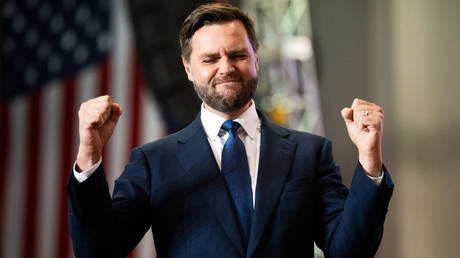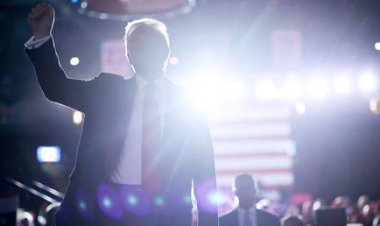J.D. Vance Achieves What Trump Has Not
The Republican vice presidential nominee demonstrated a strong performance in the debate by maintaining a reasonable, polite demeanor and concentrating on policy matters.. source:TROIB RTS

This debate was filled with unexpected moments, particularly as it evolved into something resembling a genuine political discourse that remained civil and polite—a remarkable rarity in today's political landscape, especially given the tenor of the Trump era. While Trump is often characterized by his inability to engage substantively on policy, opting instead for personal insults, Vance and Walz managed to avoid such gutter tactics.
Perhaps the most notable change in this debate was the emergence of a revamped J.D. Vance. He moved away from the contentious tactics associated with his former mentor and adopted the persona of a youthful, compassionate conservative. Vance even indicated a willingness to consider bipartisan collaboration with Walz on certain issues, though he did not spare criticism for Kamala Harris, whom he condemned for her “atrocious economic record” and inaction regarding illegal immigration.
Vance's political identity has shifted over time—ranging from a vocal critic of Trump, likening him to Hitler, to a sycophantic supporter who sometimes exceeded his mentor in crudeness. This latest version, however, presents an image of a caring conservative engaged in serious policy discussion, leading one to question the frequency of Vance's political transformations.
During the debate, the new Vance effectively articulated a version of “Trumpism with a human face,” creating the impression of a coherent and approachable political agenda—an achievement that Trump himself has struggled to attain. Vance appeared calm and self-assured, attempting to distance himself from Trump’s controversial stances, particularly when pressed about the “stolen election” narrative and the January 6 riots, where he was accurately characterized by Walz as providing “damning non-answers.”
While Walz spoke, Vance wore a smile reminiscent of a composed predator gauging its target.
This newly presented Vance is likely a strategic maneuver aimed at appealing to pivotal swing voters, who may be alienated by Trump's divisive and abrasive style. However, it would be unfair to label him a sincere advocate for conservative values.
Yet, such political duplicity and anti-intellectualism seem to resonate in contemporary American politics. In this debate, Vance clearly came out on top. Trump might be feeling unsettled by this newly polished veneer of his vice presidential nominee, which starkly contrasts with the fiery right-wing zealot he initially endorsed, suggesting Vance could be more electorally viable than Trump himself.
Instead of presenting a realistic portrayal of Trump during the debate, Vance opted for a sanitized model, making for an intriguing dynamic as the campaign progresses and potentially if Trump were to win the presidency.
Walz's response to this unexpected version of J.D. Vance was lackluster. He appeared flustered and uncertain, often looking grumpy while Vance made condescending smiles throughout their exchange. While Walz delivered compelling points on some issues, he seemed uncomfortable at times.
Walz is more adept on the campaign trail, where his enthusiasm thrives. In the debate setting, he seemed rigid and anxious, notably taking excessive notes—an unflattering look on television. His discomfort became more apparent when he conceded to misrepresenting his whereabouts during the Tiananmen Square protests, labeling himself a “knucklehead” who “sometimes misspoke.”
Furthermore, Walz hesitated to confront Vance about his previously extreme positions. He seemed unsure how to engage with Vance’s altered political identity, opting instead to accept it as is.
The policy debate lacked depth, as Vance suggested there could be common ground on issues like abortion and gun control between him and Walz, excluding Harris. Both candidates recited standard talking points regarding Israel, without considering American intervention in the escalating Middle Eastern conflict.
Vance proposed a more refined interpretation of Trump's stance on immigration, avoiding any crude references, while Walz endeavored to defend Harris and Biden’s poor record on the subject.
Vice presidential debates typically don’t sway presidential elections significantly, and the impact of this encounter remains uncertain. Nevertheless, Vance’s impressive showing could draw some swing voters to Trump’s camp, tightening the race for the upcoming election in November.
Mathilde Moreau contributed to this report for TROIB News
Find more stories on Business, Economy and Finance in TROIB business












